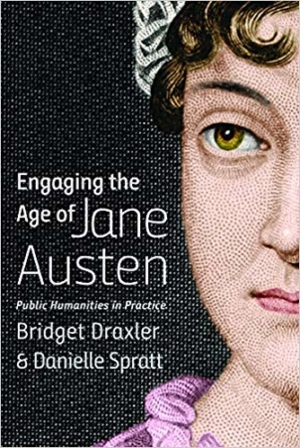I couldn’t be happier that my essay “Gain Experience!: Literature, Travel, and Life” (echoing Mary Wollstonecraft’s famous advice) is forthcoming in Engaging the Age of Jane Austen, edited by Bridget Draxler and Danielle Spratt (University of Iowa Press, 2019). I’m so grateful to Bridget and Danielle for this opportunity. In the essay, I share particular study-abroad strategies that have engaged students on my January term course “In Frankenstein’s Footsteps: The Keats-Shelley Circle in London, Geneva, and Italy.”
A description of the book, from the University of Iowa Press Website:
“Engaging the Age of Jane Austen is a valuable compilation of case studies on how to combine the study of eighteenth-century texts with public engagement. Its conversational tone and wide array of topics and contributors will help readers take away tips on how to expand their pedagogy and research to include wider audiences—a must for any contemporary scholar.”—Amy Hildreth Chen, University of Iowa
“The work is important and timely, the scholarship is up to date and comprehensive, and the book has a good balance of theory, history, textual explication, and individual testimony about praxis that is truly engaging.”—Deborah Denenholz Morse, William & Mary College
Humanities scholars, in general, often have a difficult time explaining to others why their work matters, and eighteenth-century literary scholars are certainly no exception. To help remedy this problem, literary scholars Bridget Draxler and Danielle Spratt offer this collection of essays to defend the field’s relevance and demonstrate its ability to help us better understand current events, from the proliferation of media to ongoing social justice battles.
The result is a book that offers a range of approaches to engaging with undergraduates, non-professionals, and broader publics into an appreciation of eighteenth-century literature. Essays draw on innovative projects ranging from a Jane Austen reading group held at the public library to students working with an archive to digitize an overlooked writer’s novel.
Reminding us that the eighteenth century was an exhilarating age of lively political culture—marked by the rise of libraries and museums, the explosion of the press, and other platforms for public intellectual debates—Draxler and Spratt provide a book that will not only be useful to eighteenth-century scholars, but can also serve as a model for other periods as well. This book will appeal to librarians, archivists, museum directors, scholars, and others interested in digital humanities in the public life.
Contributors:
Gabriela Almendarez, Jessica Bybee, Nora Chatchoomsai, Gillian Dow, Bridget Draxler, Joan Gillespie, Larisa Good, Elizabeth K. Goodhue, Susan Celia Greenfield, Liz Grumbach, Kellen Hinrichsen, Ellen Jarosz, Hannah Jorgenson, John C. Keller, Naz Keynejad, Stephen Kutay, Chuck Lewis, Nicole Linton, Devoney Looser, Whitney Mannies, Ai Miller, Tiffany Ouellette, Carol Parrish, Paul Schuytema, David Spadafora, Danielle Spratt, Anne McKee Stapleton, Jessica Stewart, Colleen Tripp, Susan Twomey, Nikki JD White, Amy Weldon
Subjects:
Literary Criticism
